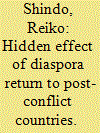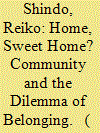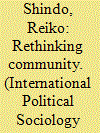| Srl | Item |
| 1 |
ID:
116850


|
|
|
|
|
| Publication |
2012.
|
| Summary/Abstract |
In response to the paucity of human resources in post-conflict societies, various agencies have implemented programmes to facilitate returns of qualified diasporas to their countries of origin. This paper examines the context in which diaspora return programmes have emerged and developed, and implications of the return programmes for post-conflict societies. It specifically looks at Migration for Development in Africa (mida) using the example of Rwanda. The paper demonstrates that the prime purpose of diaspora return programmes is to mitigate the effect of brain drain caused by migration from the South to the North. Furthermore, the paper argues that a secondary purpose of the programmes can be to secure a chance of return for diasporas who would like to return to their countries of origin but would like to stay away from the politics of these countries. In conclusion, the author suggests that diaspora return may increase the multiplicity of voices available in countries that tightly control dissident voices.
|
|
|
|
|
|
|
|
|
|
|
|
|
|
|
|
| 2 |
ID:
177719


|
|
|
|
|
| Summary/Abstract |
Inspired by Kei Iwaki’s observation about migration and language discussed in her book, Farewell, My Orange (2013), this article examines migrants’ relationship to the host community’s language in parallel to their ambivalent sense of belonging. Migrants are eager to master the host community’s language and be part of the community. At the same time, they are suspicious of their own eagerness to do so. Rather than asking, ‘How can the acquisition of the local language facilitate better integration of migrants?’, the question that animates this article is: what kind of image of home is communicated by the narrative which assumes language to be a critical tool for integration? How might we start thinking about home differently if we are to address migrants’ desire to be part of the community and, at the same time, their refusal to be part of it? To investigate these questions, I will draw on Bonnie Honig’s concept of dilemmatic space. I will argue that home, which emerges in migrants’ paradoxical emotional terrain, is a place of untranslatability where foreignness remains incomprehensible.
|
|
|
|
|
|
|
|
|
|
|
|
|
|
|
|
| 3 |
ID:
159785


|
|
|
|
|
| Summary/Abstract |
What happens to sovereign power when petty sovereigns refuse to exploit discretionary power to suspend the rule of law, the very power that is delegated to them and makes them who they are? How might such a refusal contribute to a better understanding of the relationship between resistance and sovereign power? This article revisits Judith Butler’s notion of petty sovereigns to explore the possibility that petty sovereigns establish a distinctive relationship with law. This article draws on a case involving one nameless petty sovereign and his published writings. He writes novels to expose how law is used by some officials to realize a particular policy goal with regards to nuclear energy. His novels blur the line between fiction and non-fiction: it contains classified information only available to bureaucrats, discusses actual energy policies and related laws, and introduces fictional characters who resemble non-fictional characters. I argue that this example suggests that petty sovereigns are not necessarily tied to the node between governmentality and sovereignty. Shifting between the worlds of fiction and non-fiction, petty sovereigns slip away from sovereign power, which controls the subject-making process, and quietly resist sovereign politics through the contingency of subjectivity.
|
|
|
|
|
|
|
|
|
|
|
|
|
|
|
|
| 4 |
ID:
114111


|
|
|
|
|
| Publication |
2012.
|
| Summary/Abstract |
In this paper, I explore one way of thinking about political community. Drawing on Jean-Luc Nancy's idea of community, I suggest that community is not a full circle, but an open-ended line. Thinking community-as-a-line is to shift our focus from the completed pictures of community to the inception of community. In this way of thinking, community is a shared mode of being. I argue that at the heart of sharing lies translation-communication - or translation space - where one (singularity) is perpetually ingrained in others (plurality). The subject constantly "emerges" in relation to others in translation space. I argue that looking at community as a line is a way to avoid the statist boundary, the subject of which is situated either inside or outside. I further argue that the elusive subject in translation space engages in politics through escape.
|
|
|
|
|
|
|
|
|
|
|
|
|
|
|
|